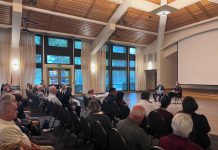Problems with Proposition 90, that have devastating impacts on
the environment, are hidden in the fine print.
I have reviewed with interest the articles on Proposition 90 that have appeared in the Morgan Hill Times and would like to offer the following counterpoint to describe what many see as major problems with Proposition 90.
Proposition 90, the Taxpayer Trap, is a classic bait and switch. Proponents have hijacked a popular issue, eminent domain reform, but they have hidden in the fine print unrelated and far-reaching provisions that will cost taxpayers billions of dollars each year, entangle the state in costly and wasteful litigation, and have devastating impacts for our environment, local communities and consumers.
We agree something must be done to address eminent domain abuses in California, but Proposition 90 is not the answer. Because of its far-reaching nature, Proposition 90 is opposed by a broad coalition of groups including the League of California Homeowners, California Professional Firefighters, League of Women Voters of California, California Taxpayers Association, California Chamber of Commerce, California Small Business Association, California Labor Federation, California League of Conservation Voters, the CA Farm Bureau Federation, and hundreds of other groups throughout the state.
The small group of out-of-state developers who paid to put Proposition 90 on the ballot are using the public’s concern over eminent domain to advance an extreme agenda. Rather than put forth a well-designed reform that addresses eminent domain abuses, they have snuck in far-reaching provisions that are completely unrelated to eminent domain.
Proposition 90 fundamentally changes our constitution to require new taxpayer payouts any time a new law or regulation is passed that someone believes has caused them “substantial economic loss”. While on its surface this may seem rational, Proposition 90 is anything but. Proposition 90 is so poorly written and rife with loopholes that even the most basic and important laws are subject to litigation and new payouts – at the taxpayers’ expense.
Under Proposition 90, if a city reduces a development from 750 homes to 500 because of school crowding or environmental concerns the developer could make a claim against the taxpayers for the alleged “loss” of 250 houses.
Under Proposition 90, wealthy developers could make claims against taxpayers whenever California agencies act to protect our natural resources including the coast, wildlife and habitat, marine water quality, and regulate growth and development. That’s because it allows a developer to claim environmental protection has caused “economic loss” requiring massive taxpayer payouts or forcing the agency to forgo this protection.
After a similar, but narrower, law was passed in 2004 in Oregon (a much smaller state), more than 2,000 claims have been filed – seeking more than $5 billion in payments. Now state and local governments in Oregon are faced with a Hobson’s Choice: pay the claims or waive the protections.
In addition to making many environmental and other regulations difficult or impossible to enforce, Proposition 90 would make it prohibitively expensive for public agencies to acquire property for public works projects, like new schools, hospitals, transit facilities, fire protection facilities, utilities and other important public works. Proposition 90 repeals “fair market value” as the standard for payment and requires windfall payouts to landowners. This will make the costs of public works projects increase astronomically, and taxpayers will have to pay.
Conservation organizations, labor, public safety organizations, business, taxpayer, agriculture and local governments are all opposing Proposition 90 because they recognize Proposition 90 will result in degradation of environmental protections and land use, cause community planning chaos and will cost taxpayers billions.
For more information about Proposition 90 or to get involved, please go to www.NoProp90.com
Tom Adamas is board president of the California League of
Conservation Voters.







